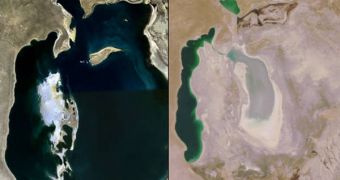In their annual summit, the five nations in Central Asia are focusing their discussions on the issue of water security, which seems to be getting increasingly desperate over short periods of time. Tajikistan and Kyrgyzstan, two of the five countries, hold together about 80 percent of the region's waters, in reservoirs and lakes up in their mountains. Conversely, the other three states, Uzbekistan, Turkmenistan and Kazakhstan, need very large amounts of the stuff, to help them sustain their growing cotton industry, as well as the water-intensive agriculture they operate.
The bad part about the talks is that the countries have a history of not getting along. Even worse, a series of mismanaged water infrastructure projects have led to the catastrophic demise of the Aral sea, which has significantly reduced its volume over the past two decades by more than 90 percent. At this pace, all the water over the surface covered by the former sea could disappear within ten years, leaving the entire area in desperate need of the substance, the BBC reports.
The situation is aggravated by the fact that, even before the Soviet Union broke up and the five nations became independent, water was a precious resource in the region. After 1991, the states sought to get as much of it as possible, each for itself, and failed to understand the importance of developing a regional water-management plan. Two decades later, this poor approach to handling their problems started revealing its ugly consequences. And the current talks will not be made easy by the looming pressure, with the three “downstream” countries pushing the “upstream” two for more water.
However, the latter two have most to suffer of cold during winters, and have been pushing for the construction of hydroelectric power plants on their territories for a long time. The others strongly oppose the initiative, saying that the irrigation systems that keep their cotton harvest afloat would go dry. During the Soviet era, an intricate resource transport system allowed for the five nations to exchange natural gas and electricity, as well as water, but the infrastructure has long since been shut down.
In addition, at the latest talks, the Russian Federation has not been invited, even though the largest country on Earth has an interest in the waters of the region. Analysts are skeptical that the conference will yield any positive results. Most likely, the officials will get into endless arguments over things that pass, and leave the most pressing issue undiscussed.

 14 DAY TRIAL //
14 DAY TRIAL //